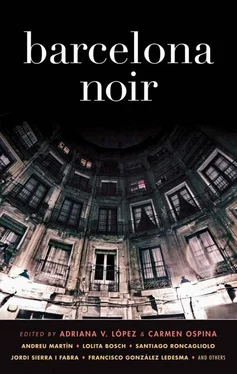Сантьяго Ронкальоло - Barcelona Noir
Здесь есть возможность читать онлайн «Сантьяго Ронкальоло - Barcelona Noir» весь текст электронной книги совершенно бесплатно (целиком полную версию без сокращений). В некоторых случаях можно слушать аудио, скачать через торрент в формате fb2 и присутствует краткое содержание. Город: New York, Год выпуска: 2011, ISBN: 2011, Издательство: Akashic Books, Жанр: Детектив, на английском языке. Описание произведения, (предисловие) а так же отзывы посетителей доступны на портале библиотеки ЛибКат.
- Название:Barcelona Noir
- Автор:
- Издательство:Akashic Books
- Жанр:
- Год:2011
- Город:New York
- ISBN:978-1-936070-95-4
- Рейтинг книги:5 / 5. Голосов: 1
-
Избранное:Добавить в избранное
- Отзывы:
-
Ваша оценка:
- 100
- 1
- 2
- 3
- 4
- 5
Barcelona Noir: краткое содержание, описание и аннотация
Предлагаем к чтению аннотацию, описание, краткое содержание или предисловие (зависит от того, что написал сам автор книги «Barcelona Noir»). Если вы не нашли необходимую информацию о книге — напишите в комментариях, мы постараемся отыскать её.
Barcelona Noir — читать онлайн бесплатно полную книгу (весь текст) целиком
Ниже представлен текст книги, разбитый по страницам. Система сохранения места последней прочитанной страницы, позволяет с удобством читать онлайн бесплатно книгу «Barcelona Noir», без необходимости каждый раз заново искать на чём Вы остановились. Поставьте закладку, и сможете в любой момент перейти на страницу, на которой закончили чтение.
Интервал:
Закладка:
I remain inert and I hear my grandfather cry. There’s barely any air left in my lungs and I can’t distinguish anything through the plastic, just a milky fog that vanishes when I close my eyes.
The Predator
by Santiago Roncagliolo
Barri Gòtic
At thirty-nine years of age, Carmen was resigned to her loneliness. She wasn’t pretty but she wasn’t ugly either, and averageness extended to every part of her life: neither rich nor poor, neither dumb nor exceptional. Carmen had such normal attributes — so few attributes — that she blamed her lack of having a partner on her demanding temperament and on luck. Not necessarily bad luck. Just her luck.
It’s also not like she was a spinster or a prude. She’d had partners throughout her adult life. Some were quite pleasant. At the very least, they were steady. Most of her relationships had wasted away over time, and those that survived for several years tended to vanish when it came time to take the next step to marriage or parenthood. It wasn’t, like her mother said with malice, that men refused to get married. It was actually Carmen who could rarely seem to make the commitment beyond six or seven weekends. She understood that she’d rather carry her tedium alone than share it. And if her sheets were cold, she preferred a hot water bottle to a tepid companion as a solution.
Anyway, to fill up her immediate world, she had her officemates. Carmen worked near Comercio Street in a travel agency. The biggest part of her job wasn’t to send people out into the world, but to organize the tourists — each time more numerous — who came to visit Barcelona. In a way, the agency was not a starting point but rather a finish line, the last stop, which was underscored by its physical location: lost in the tangled alleys of Born, boxed into a dead end, under a vaguely ancient archway, practically invisible to the pedestrians; the office seemed like an enchanted cave in a forest.
The advantage in this was that clients tended not to even come to the office, which created a certain closeness among the staff. Carmen’s four colleagues — Dani, Milena, Lucía, and Jaime — had established a warm camaraderie that was respectful of each others’ private lives and allowed them to share their joys while avoiding intimacies. So when Milena’s mother died, they all went to the funeral to be with her. And when Jaime got pneumonia, they all took turns bringing him soup at home. But when Carmen found out she had cysts that were affecting her kidney, she didn’t want to bother anybody with her medical problems. And when her last boyfriend left her — Carmen remembered him well because he really hurt her when he split — she spent days locked in the bathroom crying, but never got it off her chest with her colleagues. She didn’t even tell Daniel, the gay one, with whom she shared the most confidences. Carmen knew she could count on his support for small things but she was afraid that if she asked or needed more, it would cross the delicate line from collegiality to emotional blackmail.
The personal calendar at the office included festive events of which the most important were birthdays. Five times a year, after closing time, the group celebrated one of its members’ birthdays. They would collect money among themselves so they could offer the honored one a significant gift, usually a bottle of fine perfume or cologne. And they blew out the candles on the cake, although since the girls were always on diets, the chocolate cakes had been reduced to muffins and coffee. Each time, these ceremonies included the retelling of the same jokes and, though it wasn’t an orgy of fun, Carmen enjoyed them: she loved the certainty of small everyday rituals which made life easy to manage, free of surprises.
When she turned forty, the day coincided with Barcelona’s Carnival and someone in the office — maybe Lucía, who could be a little over-the-top sometimes — had suggested dressing up in costumes and going out on the streets together, barhopping. Carmen thought Carnival was colorful and she’d been to it several years ago, but simply to watch, dressed as herself, protected by her normality while surrounded by the most extravagant and ugliest masks. She was willing to do it again on those same terms, with a kind of prophylactic barrier between her and the Carnival, smiling at the clever costumes in the same way she would smile at a spectacle on a stage. But the problem, to her dismay, was that the office staff had announced a surprise , which no doubt included a mandatory costume.
Carmen hated all that: surprises, costumes, and what she called “street madness.” They struck her as childish entertainment wholly inappropriate for responsible adults. But to refuse would have meant introducing an element of confrontation to her secure work environment, and she wasn’t willing to risk the stability of her tiny universe. Plus, to be honest, there really was no Plan B for that night. If she said no, she’d have to eat dinner with her mother. And she would do anything, even go out in the streets dressed as a monster, to avoid dining out with her mother on the night of her birthday.
As long as Carmen could remember, her mother had ruined her birthdays. She was a woman with an extroverted personality, who loved parties and party guests, and who always had a house full of people. As a result, she tried to turn each of her daughter’s birthdays into a great social event for kids. She would move all the furniture out of the living room, buy tons of food and drink, and send out invitations every which way, even to girls who weren’t Carmen’s friends or, worse, who were declared enemies. If Carmen protested, her mother responded by saying that there’s no better place to make friends than a party, and that there couldn’t be too terrible a problem between girls her age anyway.
But Carmen — perhaps precisely as a response to all that — was a retiring and timid girl who would hide out in a corner while the other girls had fun and her mother bantered with the adults. Sometimes, while she tried to make herself invisible, she went from being a hostess to being her guests’ victim. When the more seasoned girls would realize that she wasn’t reacting to any of their verbal provocations, they’d come up with other ways to torment her: they pulled her braids; they shoved her; they laughed at her; they stuck jelly candies on her clothes; they stole her gifts. And later, when her mother approached them, they would pretend that everything was fine and force Carmen to smile and pretend as well. Of course, the first few times Carmen tried to tell her mother, but she just said, “Dear, you have to learn to relax. Your friends are only playing.” With those words, she forced her to play as well. She told Carmen she had to learn to get along.
Since the human world was hostile, Carmen would take refuge in the toy world, especially the world of stuffed animals, which she loved. Her collection included a bear with button eyes, a zebra, a very fat cat, and a cow with a fat pink udder, among many that hung from her walls and filled her closet. Carmen treated these toys like friends. She’d gather them in a circle in the middle of her room and pretend to have tea. She’d let them decide what they wanted to play. She slept with them, and when there were too many to fit with her under the sheets, she’d give them her bed and sleep on the rug. They deserved it; at least they deserved it more than people.
Her favorite was a dark brown little wolf her father had brought her from Germany. She called him Max. When her mother once asked where she’d gotten such a name, Carmen replied, “That’s what he wants to be called.”
In fact, sometimes it seemed that Max the wolf had his own life, and he’d pop up in the most unexpected places: in the kitchen knife drawer, under her parents’ bed, in the tub. At the same time, Carmen seemed to have a lot less of a presence. When she got home from school, she’d lock herself in her room with her stuffed animals and would have to be dragged out for dinner. When there were visitors, even children, Carmen would hide under the bed with her stuffed animals. As each day passed, she seemed to communicate more and more exclusively with them, delegating the role of spy in the outside world to Max.
Читать дальшеИнтервал:
Закладка:
Похожие книги на «Barcelona Noir»
Представляем Вашему вниманию похожие книги на «Barcelona Noir» списком для выбора. Мы отобрали схожую по названию и смыслу литературу в надежде предоставить читателям больше вариантов отыскать новые, интересные, ещё непрочитанные произведения.
Обсуждение, отзывы о книге «Barcelona Noir» и просто собственные мнения читателей. Оставьте ваши комментарии, напишите, что Вы думаете о произведении, его смысле или главных героях. Укажите что конкретно понравилось, а что нет, и почему Вы так считаете.












